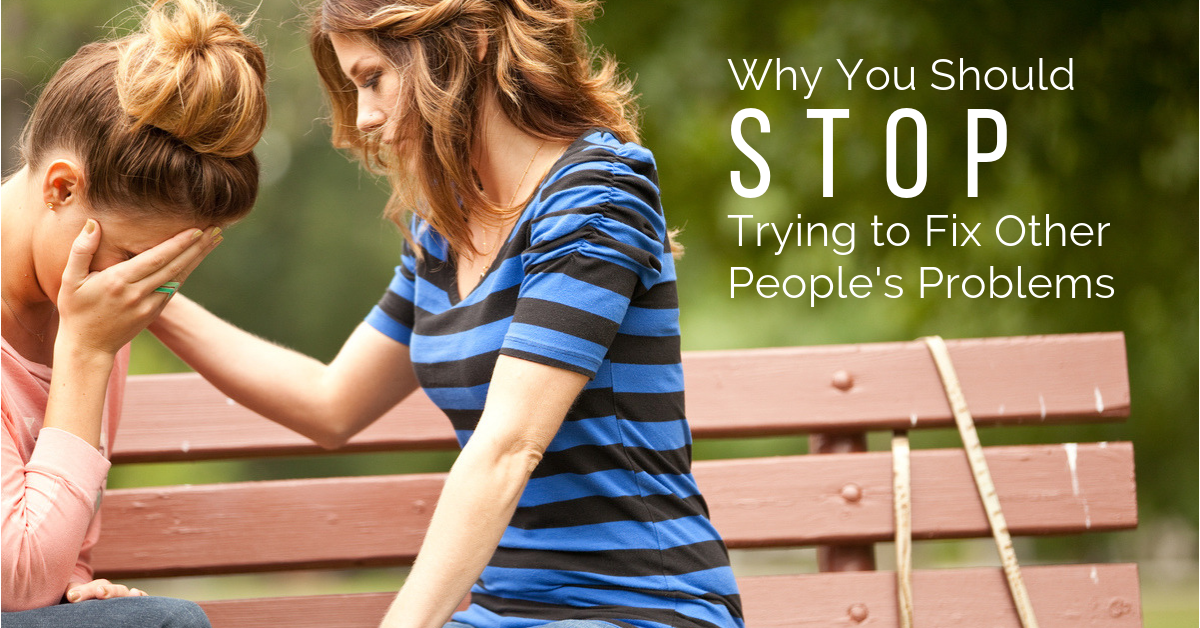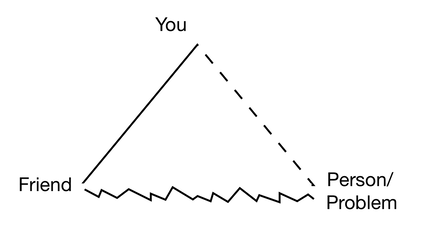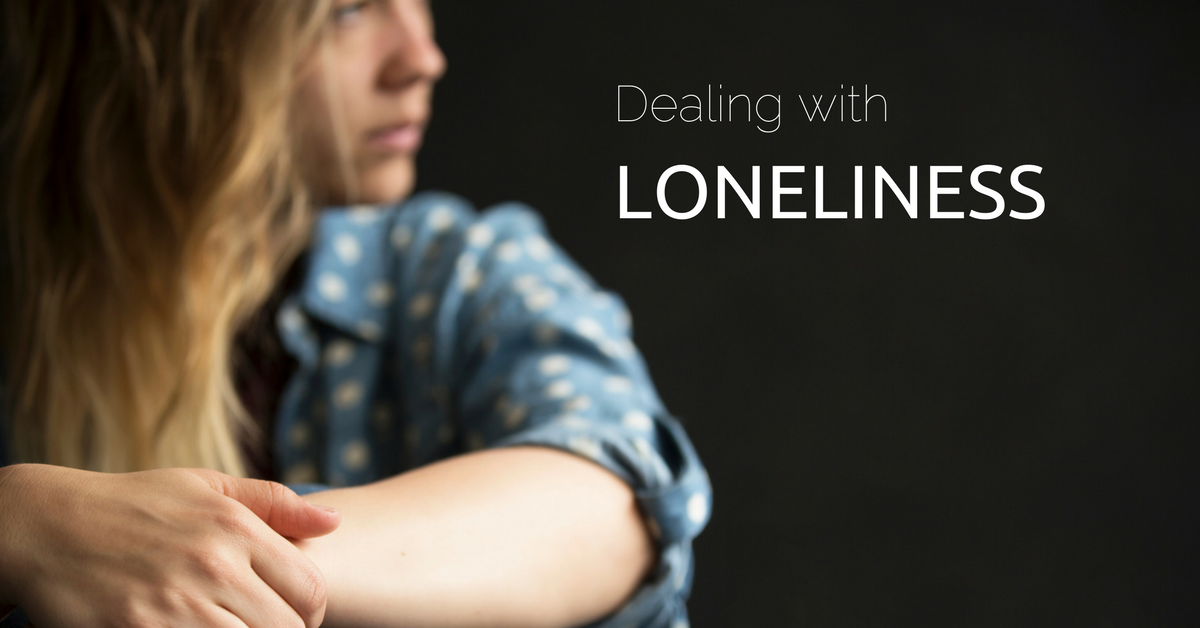|
by Rev. Tres Adames, MDiv, BCPC A friend you've known for years comes to you for help. They are desperate, emotional, and ask you to intervene. Maybe it's a problem with their partner, a habit they are trying to kick, or a struggle with anxiety or depression. You care about your friend, so of course you want to help. But before you jump in, it might be time to step on the brakes. There is nothing wrong with wanting to support your friend, but make sure you don't get in over your head. There is a difference between helping your friend versus taking on their problem. This is hard especially for empathetic people. We want to pitch in and help out. Yet it creates more problems if we don't approach it the right way. Aren't We Supposed to Help Others? Those I work with in counseling will point to the Bible, mentioning that we should help other people. This is true—we are supposed to care about others and help them, but only when they cannot help themselves. The Bible not only stresses the importance of helping others, but also emphasizes the importance of taking personal responsibility. According to the words of the Apostle Paul: Brothers and sisters, if someone is caught in a sin, you who live by the Spirit should restore that person gently. But watch yourselves, or you also may be tempted. Carry each other’s burdens, and in this way you will fulfill the law of Christ. If anyone thinks they are something when they are not, they deceive themselves. Each one should test their own actions. Then they can take pride in themselves alone, without comparing themselves to someone else, for each one should carry their own load" (Galatians 6:1-5, NIV). What is Paul saying here? He encourages the Galatians to "carry each others's burdens" but also that "each one should carry their own load." How is this possible? Aren't they the same thing? Not necessarily. In their book, Boundaries, Henry Cloud and John Townsend shed some light on the difference between a load and a burden: "The Greek word for burden means 'excess burdens,' or burdens that are so heavy that they weigh us down. These burdens are like boulders. They can crush us. We shouldn’t be expected to carry a boulder by ourselves! It would break our backs. We need help with the boulders — those times of crisis and tragedy in our lives. In contrast, the Greek word for load means 'cargo,' or 'the burden of daily toil.' This word describes the everyday things we all need to do. These loads are like knapsacks. Knapsacks are possible to carry. We are expected to carry our own" (Cloud & Townsend, 2017). We can help and be supportive, but we are not called to fix other people's problems or take responsibility for them. Paul is emphasizing the need for love and personal responsibility. In order to learn how to do this, let's dive deeper and explore this from the world of family systems theory. Don't Get Triangled! One of the most impactful books on relationships in the field of pastoral counseling is Generation to Generation by Edwin Friedman. In the book, Friedman describes what is known as an emotional triangle. According to Friedman: “The basic law of emotional triangles is that when any two parts of a system [this could be a family, a work environment, or a circle of friends] become uncomfortable with one another, they will ‘triangle in’ or focus upon a third person, or issue, as a way of stabilizing their own relationship with one another” (Friedman, 1985). Often, a third person is pulled into a triangle when two people in a relationship are in conflict with one another. To stabilize the relationship, another person is asked to help or may even be pulled into the situation by one or both people in the relationship. Sometimes the third person may intervene or “triangle” themselves into the unstable relationship out of desire to help. An example of an emotional triangle would be: 1) An adult man who is estranged from his adult brother 2) The brother 3) The parent who is asked to intervene or communicate on behalf of both. A part of an emotional triangle can also be a problem, such as an addictive habit or dysfunction. An example of a triangle involving a problem would be: 1) A person struggling with substance abuse 2) The substance abuse itself 3) An enabling partner. Let's take a look at this visually: Here you see the relationship between you and your friend indicated by a straight line. Your friend's struggling relationship with the other person (or problem) is represented by a jagged line. Notice that a broken line connects the third side of the triangle. Why? This is to indicate that there typically exists no control or real influence between you and the other person's relationship or problem. When any relationship is stuck, it is likely because a third person or issue has been interjected into the relationship. If you are the third wheel being introduced, the fact of the matter is that you have very little control over the outcome. If you try to fix the problem, you will only absorb the anxiety and stress from the whole situation. Sometimes, interfering can even produce the opposite effect. Attempting to reconcile two sparring partners may make them more distant or hostile. So what's the takeaway? Don't get triangled! Don't allow yourself to be put in the middle of the situation. So how can you help your friend who comes to you for support? Let's talk about a few healthy and more effective ways to influence change. 5 Effective Ways to be Supportive 1. Improve your relationship with both sides--Friedman notes that “We can only change the relationship to which we belong. Therefore, the way to bring change to the relationship of two others (and no one said it is easy) is to try to maintain a well-defined relationship with each, and to avoid the responsibility for their relationship with one another” (Friedman, 1985). Seek to be mature and get along with both sides. This might mean giving the benefit of the doubt to both persons in a conflicted relationship. If it concerns a friend struggling with addiction, work on your relationship with your friend and also work on your relationship with addiction itself—that is, learn more about addiction and how it works so you are more educated on how to respond. 2. Focus on the person, not the problem—Rather than getting caught up in solving the problem, encourage your friend's ability to take responsibility for it on their own. When the conversation drifts toward venting about the other person or problem, bring the focus of the discussion back to your friend. Ask how they are feeling and what's going on inside. 3. Ask questions, don't give answers—If your friend is insistent on talking about the problem, don't offer any solutions. Simply ask questions about how they plan to tackle the issue. This encourages them to strategize on their own rather than depending on you to solve their problem. 4. Be kind, but firm—Set boundaries with your friend as needed. If they keep calling or texting you, let them gently know that you aren't always available. Suggest other sources of support. Consider referring them to a local Christian counselor who specializes in the issue they are facing. 5. Remain self differentiated—Take care of yourself and acknowledge that this is not your problem—thankfully! Remain grounded, present, and non-anxious while still remaining connected as appropriate. Encourage them to seek God for wisdom. Offer to pray for them instead of being the only one they vent to. Besides, God wants us to talk to Him. May this be the situation that draws them closer to Him. Works Cited
Feeling Alone is NormalMany people don’t want to remain single because they fear being alone. This is fairly normal, yet even those in committed relationships and marriages can feel lonely. A romantic relationship is not a cure-all or guarantee against loneliness. Part of being an adult means accepting and even embracing our aloneness. We are Relational BeingsHumans have an inherent need to connect. That is a good thing. But unhealthy connection occurs when we become overly dependent on others. We can let our neediness take over, clinging to our partners like a child to their parent. Codependency is a term referring to a relationship dysfunction where one partner is continually providing for and enabling the neediness of the other partner. These types of relationships are unstable and filled with emotional highs and lows. This dynamic can continue for years and eventually will crash and burn under the weight of all the pressure to provide. We can easily set our partners up like an idol that will eventually fail us. In order to grow out of this immaturity, we have to grow up. Our significant others are not our parents, and we are no longer children. It’s time to be adults. Being Alone with GodRather than depending on others to escape loneliness, let's consider what it means to be alone with God. There is a difference between loneliness and solitude. Spending time with God can mean praying, writing, reading Scripture, sitting in silence, and reflecting on where we are in life. These can be healing activities that are life-giving. Christ knows what it feels like to be alone: “He was despised and rejected by men; a man of sorrows, and acquainted with grief.” (Isaiah 53:3). Yet Jesus cherished his alone time with God throughout the gospels: "But Jesus often withdrew to lonely places and prayed" (Luke 5:16). Taking responsibility for our spiritual and emotional needs by connecting with God is a mark of maturity. This doesn’t mean we don’t depend on others at all, but our inner sense of security is grounded in Christ. Only He gives us a solid identity and self-worth. With this foundation, we are free to truly love others without demanding anything in return. This is perfect love—the love that makes life worth living. Subscribe to My Newsletter
It’s no secret that we live in a sex-obsessed culture. This is obvious and is often blamed as the source of many relationship problems. Temptation to lust is everywhere. Yet we live in a romance-obsessed culture as well. You need more than one person. Romance is often thought of as sweet and endearing, and desiring it doesn’t seem that insidious, so what harm can it do? Many times, expectations are set too high. Pouring too much relational energy into a romantic relationship can neglect investment in other relationships as well—close friendships and more authentic connections with family. A lot of pressure is put on one person. He or she can't be your all-in-all. This is setting the other person up as an idol, and an idol will always disappoint. Falling in love isn't all bad either. Romance is still an essential part of bonding. Those first several months in a relationship are thrilling. This initial stage is important because that is where bonding begins. However, the feelings will fade and more mature dynamics must emerge for the relationship to deepen and continue. Feelings don't keep a marriage together. Marriage is centered on commitment. The idea of romantic feelings being the deciding factor for marriage is a truly modern and very American formula. Centuries before, marriage was important for economic survival and social integration. There was also the biblical reason for marriage: uniting spiritually. These historic factors are fading away in society, so culture has nothing much left to do with marriage other than celebrate romance and the excitement of hosting a lavish ceremony. It's still possible to keep romance alive in marriage. So many call it quits after the high simmers to a low. Hence the unfortunate divorce rate in our country. But when the rush dies down, romance does not have to completely extinguish, it just takes more effort. It takes sacrifice and thinking of the other person first. It means doing things even if you don't feel like it. At times, it takes the Spirit of God to empower godly spouses to love one another. For a marriage to last, the relationship has to mature through commitment and a deepening friendship—this is where true love blossoms. If you are looking for more on marriage, I suggest the book: The Meaning of Marriage by Tim Keller. Also, be sure to subscribe to my newsletter.
 Your First Impression of God Growing up, your parents are the first impression you have of God. Because they provide for you, nurture you and discipline you, they are very ‘god-like’ to a young child. In fact, it is God who highlights this correlation in scripture and even presents Himself to us as Father. He desires a close, intimate relationship with us. One where we can call him “Abba” or roughly translated, “Daddy.” (Galatians 4:6) Worshipping God by Forgiving Your Parents. Unfortunately, we’ve all had earthly fathers that are less than perfect, and those negative qualities mistakenly get applied to God as we grow up. Yet God still presents Himself to us as Father. The process of growing up spiritually and emotionally requires you recognizing that your heavenly Father is more than your earthy father. This involves recognizing God as God, and as an adult, seeing your parents as ordinary people—people with flaws, just like you. Forgiveness is much easier when you recognize that people are human and have limitations. Boys into Men and Girls into Women. Much of your growth depends on how you were fathered. How does a child become an adult? He or she has to be fathered. If you had a father who was absent, distant or abusive (physically or emotionally), it takes the healing relational presence of God to take you through the developmental stages you still need in order to become a godly man or woman. The seed of maturity is already in you, it has to be affirmed, formed and guided. Allow God to transform and mature you. He is in fact, the perfect Father. Subscribe to My Newsletter |
Article Topics
All
Archives
July 2023
|
We're ready to help. Let's begin.
Peoria LocationInside State Farm
9299 W Olive Ave Ste 212 Peoria AZ 85345 |
Phoenix LocationInside CrossRoads UMC
7901 N Central Ave Phoenix AZ 85020 |
About |
Services |
EducationPrograms
ACPE Spiritual Care Specialist Pastoral Counseling Apprenticeship Deconstruction Course Free Grief Training Contact |
We're ready to help. Let's begin.
© 2024 Prism Counseling & Coaching. All Rights Reserved.
Christian DISC® is a registered trademark of Prism Counseling & Coaching.
Christian DISC® is a registered trademark of Prism Counseling & Coaching.







